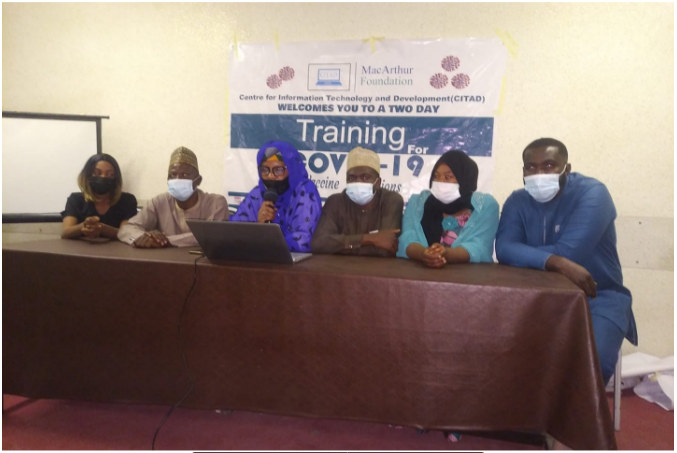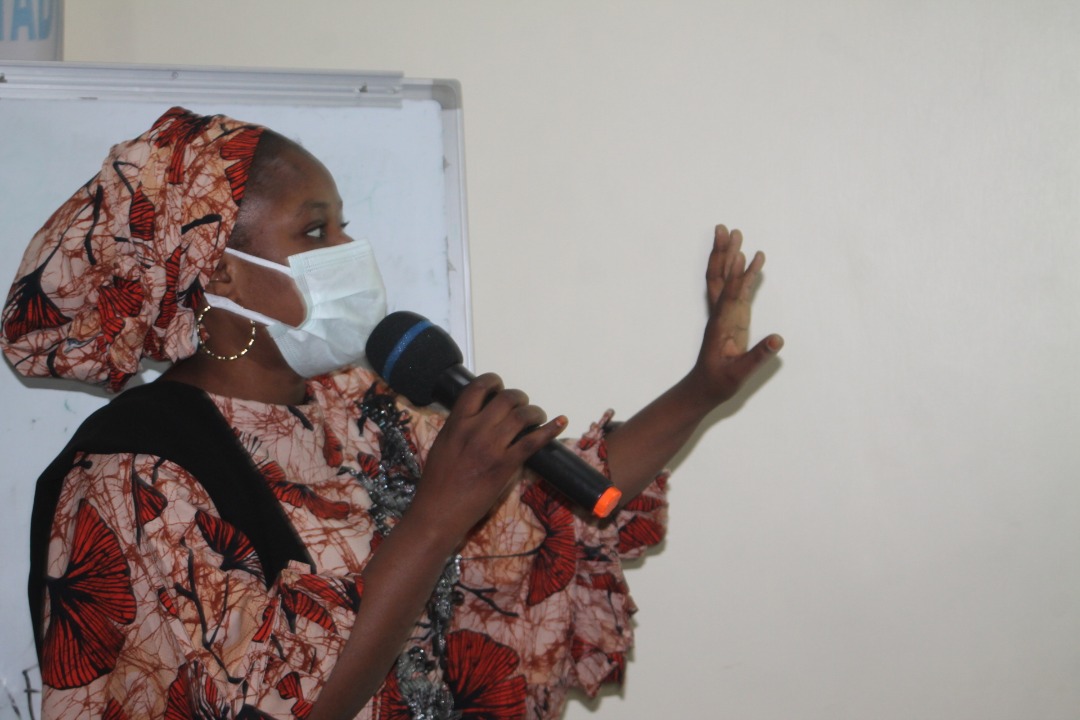 The Center for Information Technology and Development (CITAD) in partnership with the McArthur Foundation, Arewa Radio, Nigeria Internet Regulation Association (NIRA), Digital Bridge Institute (DBI), and the Facebook organized a two-day Social Influencers Summit. The summit (KANSIS) was a social clinic where participants learn, interrogated and asked questions to seek answers that would influence good governance. The summit was first introduced in 2019.
The Center for Information Technology and Development (CITAD) in partnership with the McArthur Foundation, Arewa Radio, Nigeria Internet Regulation Association (NIRA), Digital Bridge Institute (DBI), and the Facebook organized a two-day Social Influencers Summit. The summit (KANSIS) was a social clinic where participants learn, interrogated and asked questions to seek answers that would influence good governance. The summit was first introduced in 2019.
The opening session was chaired by Malam Ibrahim Tizhe former Chairman/President, Computer Professionals Registration Council of Nigeria (CPN) and current Provost, College of Fellows, Nigeria Computer Society. A number of guests including Prof Jibrin Ibrahim, Senor Research, CDD, Abuja, Dr. Chris Kwaja, Centre for Peace Studies and Research, Modibbo Adama University, Yola, Chief (Engr) C O Iromantu, elder statesman and pioneer EVC of Nigerian Communications Commission (NCC). The Minister of Digital Economy and Communication also delivered a goodwill message to the workshop through the Executive Secretary of the Universal Service Provision Fund (USPF).
Other personalities that graced the sessions included, Professor Attahiru Mohammed Jega, Professor Jibrin Ibrahim, Professor Habu Mohammed, Director, BUK Press, Professor Uba Abdallah, immediate past Vice Chancellor of the Nationla Open University, Prof Amina Kaidal of the University of Maiduguri, Ms. Osia Ojibo, the Country Director, Amnesty International. amongst others.
Presentations were delivered physically and online by people including the representative of the Director General (NITDA), Mr. Ebuka Agodo of Facebook, London, Idayat Hassan, the Director, CDD, among others. In all there were a total sixty-seven presentations in seven plenaries and 16 parallel panel sessions.
Giving the objectives of the Summit whose theme was “social media for accountable governance and peace building” the Executive Director of CITAD, Y. Z. Ya’u emphasized the importance of the Summit as an incubator of great ideas for democratic struggles, an opportunity to spread innovative systems that work in enterprise and social development and opportunity to learn from each other. He added that, the summit is expected to share ideas on how to address the serious challenges confronting our nation, especially rising conflicts and insecurity.
The summit was attended by four hundred and five people (405) consisting of 291 physically and 114 online.
Observations
Participants observed that the social media in Nigeria, like in other countries, is being deployed with both positive and negative consequences, as follows:
Positives Impact’
1. As demonstrated by several of the presentations at the Summit, many social influencers are deploying social media creatively to address various social problems in the country
2. Youth across the country are using the social media to demand accountability from duty-bearers such as the #EndSARS experience
3. Many are using social media to campaign for national unity, understanding and peace building in the country
4. Social media is being used to expose corruption and to promote transparency and accountability
5. Social media is creating a voice for citizens
6. Women and others are using the social media to expose gender-discriminatory practices and to promote inclusion and gene justice in the country
Negatives Impacts
1. Ill formed uses of the social media are contributing to the spread of divisive narratives and undermine national cohesion and unity
2. Many are consuming fake news, disinformation and misinformation with negative consequences to the society such as is the case with various fake news and misinformation about the COVID vaccine for incense
3. Hate speech is contributing to social mention across many divides in the county and in some cases had catalysed violence
4. Social media content is pervasive that makes citizens to hardly different between truth and lies
5. Gender-related harmful and negative contents is further contribution to the digital marginalization of women, making the efforts to overcome the gender digital divide doubly difficult
Challenges
participants also noted with concern certain challenges that need to be addressed including:
1. The Northern society reduces active women participation in western education and politics due to social and cultural values, an attitude that socially deny their access to rights and justice
2. Some social media influencers are made to be of different beliefs such that it divides citizens to take side or position on issues raised in a nation example; religion, culture, economic, political
3. There is an appreciable number of over 129 million users of Facebook in Nigeria; opportunity for encouraging positive social influence
4. Youth participation in Nigeria’s politics is largely on social media and
5. The film industry especially the Kannywood influences the demeaning of some cultures such as the Hausa communities through infiltrating alien cultures thereby destroying the indigenous ones
6. There is a disconnect between the numerical voting strength of youth and composition of political leadership in the country
7. Although youth are the dominant users of the social media, they have not so far been able to turn this into a political asset for their political inclusion
8. Youths are only used in politics for personal interests rather than improve governance
9. In spite of the positive impact of digitalization, there are emerging negative consequences that need to be addressed
10. Participants generally, agree that the negative aspect of the social media is enormous and must be addressed by both government and public.
11. The different dimensions of the digital divide are real and have led to the leaving of many people outside the benefits of the digital opportunities
Recommendations
1. Participants called for conscious self-oversight on the part of users of various social media platforms to check the excesses of fake news and other negative issues not in the interest of the nation
2. Government, organizations and citizens are urged to join hands together to socialize people on how to make good use of the social media
3. Called for Direct political party primaries and electronic transmission of results after voting reduces the extent of electoral fraud and urged the President to endorse these elements of our electoral reforms
4. The NASS should be engaged and encouraged by CSOs to review the legal framework of the electoral spending to curtail the influence of money on our elections
5. Social Influencers in Nigeria should be identified through their positive contributions in the society and recognized
6. Youth were challenged to be proactive and innovative on politics so as to create and claim space in governance process for themselves
7. Youth groups across the country should set agenda for political parties with a view to involving them in systems and structure of governance
8. Digitalization of education sector helps in expanding learning opportunities such as distance learning. This practice should be supported by government in order to allow space for inclusive learning especially for women and people in remote areas
9. Facebook to be engaged to commit themselves in combating and removing hate speech and fake news and particularly, disinformation from their platforms in conjunction with internal and external fact checkers
10. CITAD encouraged to rename next summit to reflect “Nigeria social Influencer’s summit”
11. In this digital age, crazy ideas are needed to provoke people to think deeply by presenting complex and multiple ideas in images presented in a soft manner
Signed:
Haruna Adamu
Chairman,
Communique Committee






